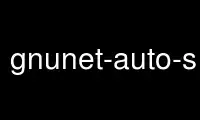
This is the command gnunet-auto-share that can be run in the OnWorks free hosting provider using one of our multiple free online workstations such as Ubuntu Online, Fedora Online, Windows online emulator or MAC OS online emulator
PROGRAM:
NAME
gnunet-auto-share - a command line tool to automatically share an entire directory with
other users
SYNOPSIS
gnunet-auto-share [OPTIONS] DIRNAME
DESCRIPTION
In order to share files with other GNUnet users, the files must first be made available to
GNUnet. This tool can be used to automatically share all files from a certain directory.
The program will periodically scan the directory for changes and publish files that are
new or that changed on GNUnet. Which files have already been shared is remembered in a
".auto-share" file in the shared directory. You can run the tool by hand or automatically
by adding the respective options to your configuration. gnunet-auto-share has many
options in common with gnunet-publish, but can only be used to index files.
You can use automatic meta-data extraction (based on libextractor).
-c FILENAME, --config=FILENAME Use alternate config file (if this option is not specified,
the default is ~/.config/gnunet.conf).
-D, --disable-extractor
Disable use of GNU libextractor for finding additional keywords and metadata.
-h, --help
Print a brief help page with all the options.
-L LOGLEVEL, --loglevel=LOGLEVEL
Change the loglevel. Possible values for LOGLEVEL are ERROR, WARNING, INFO and
DEBUG.
-p PRIORITY, --prio=PRIORITY
Executive summary: You probably don't need it.
Set the priority of the published content (default: 365). If the local database is
full, GNUnet will discard the content with the lowest ranking. Note that ranks
change over time depending on popularity. The default should be high enough to
preserve the locally published content in favor of content that migrates from other
peers.
-r LEVEL, --replication=LEVEL
Set the desired replication level. If CONTENT_PUSHING is set to YES, GNUnet will
push each block (for the file) LEVEL times to other peers before doing normal
"random" replication of all content. This option can be used to push some content
out into the network harder. Note that pushing content LEVEL times into the network
does not guarantee that there will actually be LEVEL replicas.
-v, --version
Print the version number.
-V, --verbose
Be verbose. Using this option causes gnunet-publish to print progress information
and at the end the file identification that can be used to download the file from
GNUnet.
SETTING ANONYMITY LEVEL
The -a option can be used to specify additional anonymity constraints. If set to 0, GNUnet
will publish the file non-anonymously and in fact sign the advertisement for the file
using your peer's private key. This will allow other users to download the file as fast
as possible, including using non-anonymous methods (DHT, direct transfer). If you set it
to 1 (default), you use the standard anonymous routing algorithm (which does not
explicitly leak your identity). However, a powerful adversary may still be able to
perform traffic analysis (statistics) to over time infer data about your identity. You
can gain better privacy by specifying a higher level of anonymity, which increases the
amount of cover traffic your own traffic will get, at the expense of performance. Note
that regardless of the anonymity level you choose, peers that cache content in the network
always use anonymity level 1.
The definition of the ANONYMITY LEVEL is the following. 0 means no anonymity is required.
Otherwise a value of 'v' means that 1 out of v bytes of "anonymous" traffic can be from
the local user, leaving 'v-1' bytes of cover traffic per byte on the wire. Thus, if
GNUnet routes n bytes of messages from foreign peers (using anonymous routing), it may
originate n/(v-1) bytes of data in the same time-period. The time-period is twice the
average delay that GNUnet defers forwarded queries.
The default is 1 and this should be fine for most users. Also notice that if you choose
very large values, you may end up having no throughput at all, especially if many of your
fellow GNUnet-peers all do the same.
EXAMPLES
Basic example
Share a directory "$HOME/gnunet-share/":
# gnunet-auto-share $HOME/gnunet-share/ &
Basic configuration
Share a directory "$HOME/gnunet-share/":
[ARM]
DEFAULTSERVICES = gnunet-auto-share # other default services here
[gnunet-auto-share]
OPTIONS = $HOME/gnunet-share
Use gnunet-auto-share online using onworks.net services
